Graduate Projects from 2021-22
Food Forests: Sustainable Food Production in an Unsustainable World
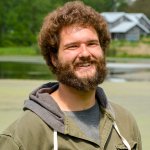
– Matt Davidson
Compared to traditional agricultural methods, food forests have several advantages. A food forest is a type of garden that mimics a natural forest ecosystem, made up of diverse perennial plants – including different species and sizes – but all are edible or benefit the edible plants. Food forests increase the strength and health of the space: many species serve as natural pesticides and fertilizers, require less maintenance and water, and more.
I began transforming the orchard at Merry Lea Sustainable Farm into a food forest by adding berry bushes, wildflowers and herbs between or around the fruit trees. I designed and implemented garden beds and transplanted wildflowers and herbs that I started from seed into the orchard.
I led several hands-on educational opportunities at Merry Lea and beyond about food forests. In the fall, high schoolers from Bethany Christian Schools planted flowers and edible plants around Merry Lea’s orchard trees. I created a curriculum about food forests, and taught Oak Farm Montessori elementary and high school students about their importance and led workdays on Oak Farm’s existing food forest over four weeks. These opportunities helped illustrate how food forests can create community, as localized food production is linked to healthier people and more connected and involved communities.
Assessment in Nature Preschool
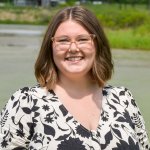
– Anna Hudson
I created an assessment method for Merry Lea’s Nature Preschool for educators to use when planning curriculum. After researching different methods, creating portfolios most closely aligned with the Nature Preschool’s philosophy and needs. Portfolios are curated collections of artifacts (like art projects, photos, videos, journals), documented anecdotes and reflections. They track students’ growth in an individualized manner that is developmentally appropriate, prioritizing growth over achievement.
I led a professional development session with Merry Lea and YMCA Nature Preschool staff about portfolios. In May, I conducted a three-day pilot test with three students, collecting data by taking pictures, transcribing videos and writing anecdotes. I let them choose which pictures and projects to put in their portfolios, including their reflections and other information they deemed important to share.
Portfolios can be a developmentally appropriate assessment to show how Merry Lea’s Nature Preschool aligns with Indiana’s Early Learning Standards through play and exploration, while being a student-centered tool where children take ownership of their learning and work.
Ferns in the Field and the Classroom
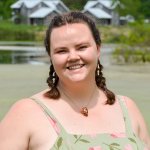
– Kylie Preston
Ferns play an important role in forests, but Indiana’s forests have a long history of being disturbed by agricultural and industrial practices. When agricultural fields were abandoned and regrew to be forests, the soil conditions were completely altered from their non-disturbed forest counterparts. These forests that were affected by agriculture have much fewer fern species. I compared the species richness of ferns between various forests around Merry Lea that were either grazed or grew row crops, and determined the best measures for restoring fern populations in the disturbed forests.
I wrote a curriculum and taught about ferns to fourth graders from Central Noble Elementary School. Through various hands-on indoor activities like observing ferns under microscopes, using visual metaphors, and creating an art project, students learned the basics of what a fern is, their functions and adaptations, and how spores help ferns survive.
A Review of Transformative Learning in the
Sustainability Leadership Semester
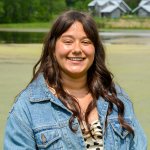
– Bella Santana
I have long been interested in the science behind human change: Why do we grow? What helps us along in this process? What techniques can be applied to education? How we change as humans and the growth we experience is a process that can be heavily influenced through our education. For my yearlong project, I focused on the transformative learning potential the Sustainability Leadership Semester (SLS) program provides. The SLS is a fall semester program where college students live and learn at Merry Lea to explore how to contribute to sustainable futures for our communities.
I collected and interpreted qualitative data from the fall 2021 SLS cohort through community meetings and field trip observations and interviews. When comparing this data with literature on Transformative Learning Theory, I found the SLS to offer participants many areas for potential growth and transformation: how they view themselves and others, how they relate to the world of academia, how they view and feel motivated towards environmental issues and environmental stakeholders, and how they can relate to their surroundings, both locally and broadly. This suggests that the SLS can be beneficial to the individual on their journey of growth and evolution.
Learning Together Through Cooperative and
Intergenerational Learning
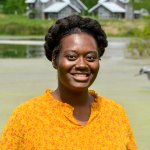
– Breanna Winfrey
I investigated the benefits and challenges of having students of different ages learning together through intergenerational and cooperative learning. Intergenerational learning is a learning method where people of different ages work together for a common goal. Cooperative learning is an instructional method where students work in small groups to accomplish a common learning goal with a teacher’s guidance.
I observed and taught with various classrooms in 9th and 5th grade at Bethany Christian Schools, with the goal of having the 9th graders in environmental science teach the 5th graders on a relevant subject. I produced a curriculum about compost, relating 5th grade math to 9th grade soil subjects, and prepared the 9th graders to teach it to the 5th graders over one week.
I also created a curriculum about composting for after-school programs to engage older students in leading and teaching others by creating and maintaining a compost bin with younger students. This inspires all types of activities that involve intergenerational learning, community building and enjoying nature inside or outside.




